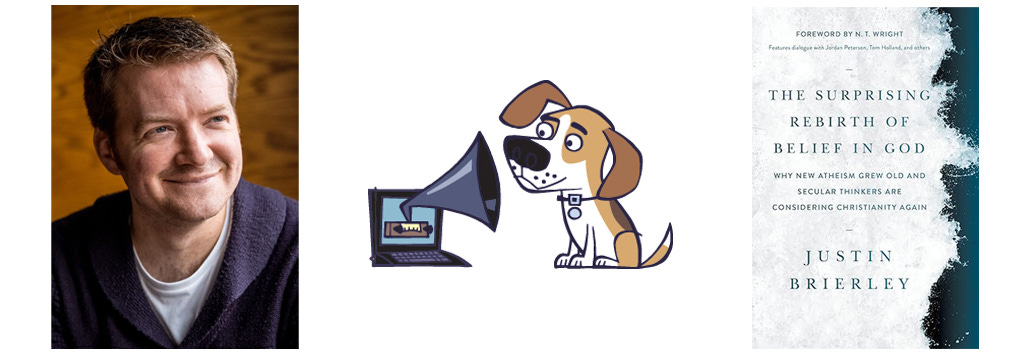Justin is a writer and broadcaster who gets Christians and non-Christians to talk to each other. He co-hosts the “Re-Enchanting” podcast for Seen & Unseen, and is a guest presenter for the “Maybe God” podcast. He also contributes to Premier Christianity magazine, where he used to be editor. His new book is The Surprising Rebirth of Belief in God, and he has a documentary podcast series of the same name.
You can listen right away in the audio player above (or on the right side of the player, click “Listen On” to add the Dishcast feed to your favorite podcast app). For two clips of our convo — on what killed the New Atheist movement, and the infinitesimal odds that life ever emerged in the universe — pop over to our YouTube page.
Other topics: his parents the “hippies who found Jesus” at Oxford; his early childhood in a Christian commune; the left and right brains of faith; conversion moments; Pascal; Augustine; the evolutionary need for religion; Hitchens and me debating the meaning of life; our disdain for proselytizing; Dawkins and the “mind virus”; atheism and why people “need more than a negative to live on”; my falling away from the Church after the sex-abuse crisis; the quasi-religious movement of BLM and wokeness; its need for purity without grace; the Trump cult; evangelicals drifting from the church-state divide; Christianism; my atheist ex-boyfriend; Ayaan’s conversion; Tom Holland; Game of Thrones as medieval Europe without Christianity; how Jesus changed human consciousness forever; Bart Ehrman; debating the details of the Resurrection; the #MeToo movement and the dignity of women; monogamy as a way to protect women from polygamist men; Louise Perry’s Case Against Sexual Revolution; how ISIS brought back crucifixion; the chasm between Christianity and its leaders; the many messiahs of the ancient world; psychedelics; sensing my friend Patrick after his death; scientific materialism; Alex Rosenberg’s The Atheist’s Guide to Reality; the problem of consciousness; panpsychism; Harari on human rights; Paul Davies and the “directionality of life”; logos as logic speaking into chaos; and why “Christianity has to stay weird.”
Browse the Dishcast archive for an episode you might enjoy (the first 102 are free in their entirety — subscribe to get everything else). Coming up: Isikoff and Klaidman on Trump’s trials; Christian Wiman on resisting despair as a Christian, Nate Silver on the 2024 race, Jeffrey Rosen on the pursuit of happiness, George Will on Trump and conservatism, and Abigail Shrier on why the cult of therapy harms children. Please send any guest recs, dissents, and other pod comments to dish@andrewsullivan.com.
Here’s a listener on last week’s convo with Jonathan Freedland on anti-Semitism and the left:
Thank you for that super interesting and very engaging conversation!
I’m a bit of an Anglophile and do follow British politics, and Jonathan is one of the few Guardian columnists I really respect. I haven’t heard you utter a single word I disagree with on the topic of Israel and Hamas, and I found Jonathan’s opinions to be so enlightening and moving, really. I listened to it on a long walk, avoiding lake-sized puddles of slush on this mucky, too-warm January day in Montreal.
That’s the perfect way to listen to the Dishcast! From another listener who enjoyed the pod:
We don’t get such detailed discussions of British politics very often here in the States. So great. But the thing that always troubles me, in that episode and many other places, is how people go on and on about how it’s not anti-Semitic to criticize the Israeli government or its policies. And I agree that it’s not inherently anti-Semitic to criticize a government and its policies, but this particular government is criticized constantly, for everything. Israel was criticized in October, before they even started the invasion of Gaza. Nasty stuff, like the crowd in Sydney chanting “Gas the Jews,” or those lovely young people at Harvard who claimed that the attack was Israel’s fault, 100%. And on and on and on. To these people, Israel can do no right, in any situation, ever.
So while it may not automatically be anti-Semitic to criticize the Israeli government, it sure as hell feels anti-Semitic to this Jew. Especially as Israel is so much better than its neighbors in terms of democracy, doesn’t torture and/or kill citizens the government doesn’t like, and has freedoms in general. Even for its Arab minority!
And stories about how the Global South disapproves of Israel would make me laugh if I weren’t so outraged. How many of these countries are beacons of democracy, freedom and tolerance? So for them to continually bash Israel is laughable, and hypocrisy of the highest order. And South Africa? Their government is hardly without some very grievous sins, including continuing to align with Russia, even in the face of their invasion of Ukraine, for which there is NO excuse.
On the other hand, the near-total obliteration of Gaza as a place where anyone could live is more like Putin’s use of the military rather than the West’s. Another on Israel:
I was fascinated by your discussion with Jonathan Freedland about anti-Semitism, which I firmly believe has been spurred to a significant degree by the actions of Netanyahu and the radical West Bank settlers. He has used Hamas to undermine the Palestinian Authority and even agreed to allow billions of dollars to be sent to Hamas by Qatar. I think Hamas and Netanyahu need each other in order to survive. I wouldn’t be surprised if he wants to prolong Israeli military action in Gaza because he knows if the fighting ends, he will likely be ousted from power when an election is held and could very well wind up in jail for corruption.
I don’t think the Palestinian Authority is up to the task of governing Gaza, judging by their record in the West Bank. They appear to be corrupt and incompetent, which begs the question of who can govern the Palestinians if a two-state solution ever came to fruition. Talk about being on the horns of a dilemma.
Another writes, “I immensely enjoyed your interview with Freedland and laughed out loud at your recollections of Keir Starmer during your grammar school days together”:
Another has a question:
I very much enjoy your writing, but I don’t like wasting time listening to podcasts. I can read text much faster than listening to speech. I would be happy to subscribe to a written transcript of your podcasts. Is that possible?
A reminder that Substack recently launched an auto-transcription feature, which you can access by clicking the gray box labeled “Transcript” below the byline of every podcast post:
This next reader wants to hear more about Nikki Haley:
I welcomed your latest commentary on Trump — I despise him as much as the next guy — but I think our fear of the fool should be kept within rational bounds. Where I get off your trolley is your characterization of Nikki Haley as “ghastly.” I scratched my head wondering where you were coming from until I listened to the Maher clip and got the picture that you see her as the second coming of Dick Cheney:
While the topic may soon be irrelevant, I am puzzled by what wars you think she is interested in launching. I listened to (suffered through?) the GOP debates, and Haley sounded to me a lot more like Reagan than Cheney. She supports money and arms for Ukraine, no US troops. (So did Christie — is he a warmonger?) Ditto for Israel. If she differs from Biden on these matters, and Taiwan, it is only a matter of degree. A perfect candidate she is not, but ghastly?
Her support for Israel is close to pathological. I suspect she’d take us to the edge of war with both China and Russia. Everything she says reminds me of unreconstructed neocons circa 2003. Someone who has learned nothing from history is not someone I’d want as president.
Another reader turns to the debate over race and IQ:
The issue is vexing me terribly. I agree that the left has done a pathetic job engaging with this explosive topic, and I commend you for taking a different approach. I recommend a popular piece published by a fellow ‘Stacker, Nathan Cofnas. I’ve also been keeping track of Hanania’s recent works on this topic, and can’t shake the nagging feeling that there’s no small amount of handwaving going on when it comes both to cultural impact on IQ as well as the societal damage a simple “hereditarian” take on this topic would reap. This is not a subject one can talk about freely at dinner parties (ha!).
I think it would be helpful for all of us to acknowledge that there is no empirical doubt that IQ is distributed differently across racial groupings. It’s just a fact. Why this is the case is highly contested — with the usual nature-nurture debate at play. I think it’s only safe to say that it isn’t 100 percent genetics, as some racists believe; and it isn’t 100 percent environment, as the current orthodoxy would have it. It’s probably some complicated mixture of the two, with interaction between both. If we can isolate what’s going on, we may be able to ameliorate it. If we deny what’s going on, we go round and round in circles. That’s why I favor more research and less stigma.
From a dissenter:
I’ve followed you since your Atlantic essay on why we should vote for Barack Obama when he ran in 2008, and I’m a paid subscriber (I had to pay because I kept wanting more when your podcasts would end early). I also follow Will Stancil on Twitter (I refuse to call it X), and I generally enjoy his commentary. I saw some of that back-and-forth on race you covered, but I didn’t dive into it carefully. Reading your own commentary, though, you bring up a dimension of this debate on race and IQ that I find really frustrating.
Listen to this episode with a 7-day free trial
Subscribe to The Weekly Dish to listen to this post and get 7 days of free access to the full post archives.














